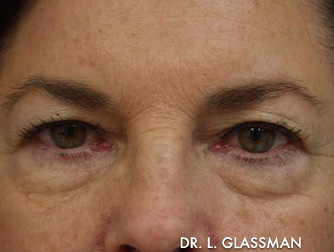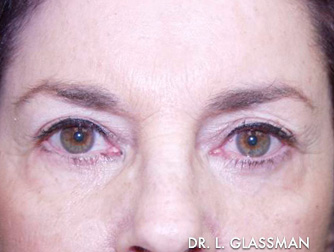Blepharoplasty
CONVENIENTLY LOCATED TO SERVE NYC, POMONA, AND ROCKLAND
Blepharoplasty, also known as eyelid surgery, is a popular procedure that can restore the youthful appearance of your eyes. There are two types of eyelid surgery, upper blepharoplasty (eye lift) and lower blepharoplasty (eye bag surgery). At Glassman Plastic Surgery, we are dedicated to providing the best blepharoplasty results NYC has to offer.
The Benefits of Blepharoplasty
Blepharoplasty can rejuvenate puffy, sagging, or tired-looking eyes by removing excess fat, skin, and muscle from the upper and lower eyelids. It may be performed for cosmetic reasons or to improve sight by lifting droopy eyelids out of the patient’s field of vision. Blepharoplasty can be combined with BOTOX® treatments to raise the eyebrows or reduce the appearance of wrinkles, crow’s feet, or dark circles under the eyes.
AM I A GOOD CANDIDATE FOR BLEPHAROPLASTY?
You may undergo a blepharoplasty for cosmetic or medical reasons. If you have puffy undereye bags, fine wrinkles, or sagging eyelids, you are most likely an excellent candidate for blepharoplasty. The procedure is recommended for people who are 30 years old or older.
Candidates for the procedure must have realistic expectations. Results will be highly individualized to match your appearance.
The blepharoplasty procedure can be performed on patients who are eligible for surgery. The best candidates are individuals in good overall health.
Candidates must not have any medical conditions that could lead to a slower healing process or complications. Before undergoing a blepharoplasty, patients must not have glaucoma, dry eyes, detached retina, thyroid disorders, heart disease, or diabetes.
Blepharoplasty candidates must be non-smokers. Please quit smoking for at least four to six weeks before the procedure. Avoid drinking alcohol for at least 48 hours before your procedure to avoid complications during and after the surgery.
YOUR BLEPHAROPLASTY CONSULTATION
During the consultation, Dr. Glassman will ask questions about your eyelid concerns and complete medical history. You may take a few lab tests to help Dr. Glassman plan and prepare an effective procedure for you.
After confirming your eligibility for blepharoplasty, Dr. Glassman will discuss surgical techniques that can be performed to give you an overview. The consultation is the right time to ask all your questions about the preparation, procedure, and recovery. This in-depth conversation will help you visualize the possible results and feel more comfortable about blepharoplasty.
HOW TO PREPARE FOR BLEPHAROPLASTY
Blepharoplasty will limit your vision for a time after the procedure. Because of this, it will be best to arrange for someone to drive you and accompany you on the day of your appointment.
Request time off work in advance to help you get enough rest. You may resume desk work after the initial recovery period.
Schedule all strenuous activities for four to six weeks after blepharoplasty. This will help you get the best possible results.
On the day of the procedure, wash your hair and take a bath or shower with mild soap and shampoo. This will prevent complications during the surgery and help you stay clean in the first 24 hours.
How Blepharoplasty is Performed
The procedure is usually performed in an office with local anesthesia and lasts 45 minutes to a few hours depending on how much work is done. Incisions are made along the eyelids in inconspicuous places (in the creases of the upper lids, and just below the lashes on the lower lids). The surgeon removes excess tissue through these incisions and then stitches them closed with fine sutures. In the case that no skin needs to be removed, the surgeon will likely perform a transconjunctival blepharoplasty, where the incision is made inside the lower eyelid and there are no visible scars.


Blepharoplasty Recovery
There will be some swelling and bruising around the area following your blepharoplasty in NYC. Any pain or discomfort can be managed with medication. The length of your recovery will vary based on the type of procedure performed, but on average patients need around two weeks to recover. You will come back for a follow-up consultation to check on your healing progress.
The Cost of Blepharoplasty
The cost of your blepharoplasty in NYC will depend on the type of blepharoplasty performed and other potential factors. During your consultation, our team can answer any question you may have about the cost of eyelid surgery in NYC and let you know about the payment options we offer.
Blepharoplasty Risks and Complications
Blepharoplasty, or eyelid surgery, has a high success rate and carries minimal risks, such as infection or scarring, which are often preventable with proper care. In rare cases, patients may experience temporary difficulty fully closing their eyes, but this usually improves with time. Discussing these points with Dr. Glassman during your consultation can offer clarity and peace of mind.
Frequently Asked Questions
How long will the results last?
Results from blepharoplasty can be long-lasting. While the procedure does not pause aging, it can significantly refresh the appearance of the eyes. Most patients do not feel the need for additional surgery for many years.
Is blepharoplasty covered by insurance?
Insurance can cover blepharoplasty only if droopy eyelids significantly impair vision. Elective or cosmetic eyelid procedures are generally not covered. Patients should verify coverage specifics with their insurance provider.
Can blepharoplasty improve vision?
Yes, for some patients, blepharoplasty can improve vision by removing excess eyelid skin that obstructs peripheral vision. This functional benefit is good for those whose droopy eyelids reduce their field of vision.
What are the differences between upper and lower blepharoplasty?
Upper blepharoplasty focuses on correcting drooping upper eyelids, which can make a person appear older or tired, and potentially impair vision.
Lower blepharoplasty is primarily aimed at removing excess skin and fat from under the eyes, addressing bags or puffiness, and restoring a more youthful and refreshed appearance.
How should I prepare for eyelid surgery?
Preparation for eyelid surgery includes stopping any medications that can increase bleeding, such as aspirin and certain anti-inflammatory drugs.
It’s also crucial to quit smoking to ensure a quick and smooth healing process.
Dr. Glassman will provide detailed preoperative instructions tailored to your specific health needs.
Are there non-surgical alternatives to blepharoplasty?
Non-surgical alternatives, such as injectable fillers or laser resurfacing, can address some concerns around the eyes.
These treatments can reduce the appearance of wrinkles and improve skin texture. However, it’s important to note that they cannot remove excess skin or significantly lift the eyelids like surgical blepharoplasty can.
What are the key factors in ensuring a successful blepharoplasty outcome?
Choosing a qualified and experienced plastic surgeon is crucial. Additionally, patients should have realistic expectations, follow pre- and post-operative care instructions carefully, and attend all follow-up appointments to monitor their recovery progress.
Schedule a Consultation Today
Contact Glassman Plastic Surgery today to schedule a consultation for your blepharoplasty in NYC. Dr. Lawrence Glassman is a highly skilled board-certified plastic surgeon who can provide you with outstanding care and natural-looking results from your blepharoplasty.

